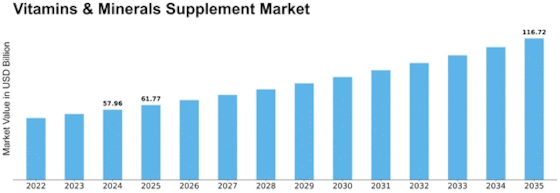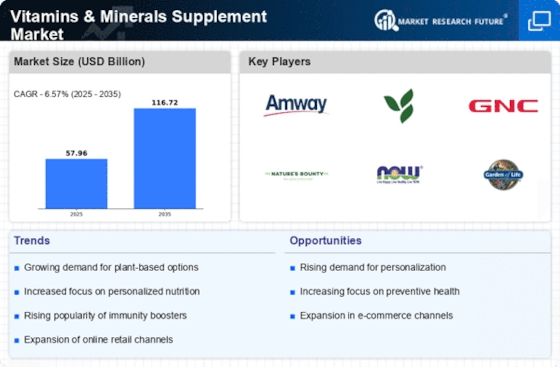Vitamins
Minerals
Powder
Capsules & Tablets
Liquid
Others
Men
Women
Unisex
Energy/Sports Nutrition
Weight Management
Immunity and Digestive Health
Anti-Cancer
Skin Care
Glycemic & Diabetes Management
Other
Supermarkets & Hypermarkets
Chemist/Pharmacies
Drugstores/Parapharamices
Online
Others
North America Vitamins & Minerals Supplement by Type
Vitamin
Minerals
North America Vitamins & Minerals Supplement by Form
Powder
Capsules & Tablets
Liquid
Others
North America Vitamins & Minerals Supplement by End User
Men
Women
Unisex
North America Vitamins & Minerals Supplement by Application
Energy/Sports Nutrition
Weight Management
Immunity and Digestive Health
Anti-Cancer
Skin Care
Glycemic & Diabetes Management
Other
North America Vitamins & Minerals Supplement by Distribution Channel
Supermarkets & Hypermarkets
Chemist/Pharmacies
Drugstores/Parapharamices
Online
Others
US Vitamins & Minerals Supplement by Type
Vitamin
Minerals
US Vitamins & Minerals Supplement by Form
Powder
Capsules & Tablets
Liquid
Others
US Vitamins & Minerals Supplement by End User
Men
Women
Unisex
US Vitamins & Minerals Supplement by Application
Energy/Sports Nutrition
Weight Management
Immunity and Digestive Health
Anti-Cancer
Skin Care
Glycemic & Diabetes Management
Other
US Vitamins & Minerals Supplement by Distribution Channel
Supermarkets & Hypermarkets
Chemist/Pharmacies
Drugstores/Parapharamices
Online
Others
Canada Vitamins & Minerals Supplement by Type
Vitamin
Minerals
Canada Vitamins & Minerals Supplement by Form
Powder
Capsules & Tablets
Liquid
Others
Canada Vitamins & Minerals Supplement by End User
Men
Women
Unisex
Canada Vitamins & Minerals Supplement by Application
Energy/Sports Nutrition
Weight Management
Immunity and Digestive Health
Anti-Cancer
Skin Care
Glycemic & Diabetes Management
Other
Canada Vitamins & Minerals Supplement by Distribution Channel
Supermarkets & Hypermarkets
Chemist/Pharmacies
Drugstores/Parapharamices
Online
Others
Mexico Vitamins & Minerals Supplement by Type
Vitamin
Minerals
Mexico Vitamins & Minerals Supplement by Form
Powder
Capsules & Tablets
Liquid
Others
Mexico Vitamins & Minerals Supplement by End User
Men
Women
Unisex
Mexico Vitamins & Minerals Supplement by Application
Energy/Sports Nutrition
Weight Management
Immunity and Digestive Health
Anti-Cancer
Skin Care
Glycemic & Diabetes Management
Other
Mexico Vitamins & Minerals Supplement by Distribution Channel
Supermarkets & Hypermarkets
Chemist/Pharmacies
Drugstores/Parapharamices
Online
Others
Europe Vitamins & Minerals Supplement by Type
Vitamin
Minerals
Europe Vitamins & Minerals Supplement by Form
Powder
Capsules & Tablets
Liquid
Others
Europe Vitamins & Minerals Supplement by End User
Men
Women
Unisex
Europe Vitamins & Minerals Supplement by Application
Energy/Sports Nutrition
Weight Management
Immunity and Digestive Health
Anti-Cancer
Skin Care
Glycemic & Diabetes Management
Other
Europe Vitamins & Minerals Supplement by Distribution Channel
Supermarkets & Hypermarkets
Chemist/Pharmacies
Drugstores/Parapharamices
Online
Others
Germany Vitamins & Minerals Supplement by Type
Vitamin
Minerals
Germany Vitamins & Minerals Supplement by Form
Powder
Capsules & Tablets
Liquid
Others
Germany Vitamins & Minerals Supplement by End User
Men
Women
Unisex
Germany Vitamins & Minerals Supplement by Application
Energy/Sports Nutrition
Weight Management
Immunity and Digestive Health
Anti-Cancer
Skin Care
Glycemic & Diabetes Management
Other
Germany Vitamins & Minerals Supplement by Distribution Channel
Supermarkets & Hypermarkets
Chemist/Pharmacies
Drugstores/Parapharamices
Online
Others
UK Vitamins & Minerals Supplement by Type
Vitamin
Minerals
UK Vitamins & Minerals Supplement by Form
Powder
Capsules & Tablets
Liquid
Others
UK Vitamins & Minerals Supplement by End User
Men
Women
Unisex
UK Vitamins & Minerals Supplement by Application
Energy/Sports Nutrition
Weight Management
Immunity and Digestive Health
Anti-Cancer
Skin Care
Glycemic & Diabetes Management
Other
UK Vitamins & Minerals Supplement by Distribution Channel
Supermarkets & Hypermarkets
Chemist/Pharmacies
Drugstores/Parapharamices
Online
Others
France Vitamins & Minerals Supplement by Type
Vitamin
Minerals
France Vitamins & Minerals Supplement by Form
Powder
Capsules & Tablets
Liquid
Others
France Vitamins & Minerals Supplement by End User
Men
Women
Unisex
France Vitamins & Minerals Supplement by Application
Energy/Sports Nutrition
Weight Management
Immunity and Digestive Health
Anti-Cancer
Skin Care
Glycemic & Diabetes Management
Other
France Vitamins & Minerals Supplement by Distribution Channel
Supermarkets & Hypermarkets
Chemist/Pharmacies
Drugstores/Parapharamices
Online
Others
Spain Vitamins & Minerals Supplement by Type
Vitamin
Minerals
Spain Vitamins & Minerals Supplement by Form
Powder
Capsules & Tablets
Liquid
Others
Spain Vitamins & Minerals Supplement by End User
Men
Women
Unisex
Spain Vitamins & Minerals Supplement by Application
Energy/Sports Nutrition
Weight Management
Immunity and Digestive Health
Anti-Cancer
Skin Care
Glycemic & Diabetes Management
Other
Spain Vitamins & Minerals Supplement by Distribution Channel
Supermarkets & Hypermarkets
Chemist/Pharmacies
Drugstores/Parapharamices
Online
Others
Italy Vitamins & Minerals Supplement by Type
Vitamin
Minerals
Italy Vitamins & Minerals Supplement by Form
Powder
Capsules & Tablets
Liquid
Others
Italy Vitamins & Minerals Supplement by End User
Men
Women
Unisex
Italy Vitamins & Minerals Supplement by Application
Energy/Sports Nutrition
Weight Management
Immunity and Digestive Health
Anti-Cancer
Skin Care
Glycemic & Diabetes Management
Other
Italy Vitamins & Minerals Supplement by Distribution Channel
Supermarkets & Hypermarkets
Chemist/Pharmacies
Drugstores/Parapharamices
Online
Others
Rest of Europe Vitamins & Minerals Supplement by Type
Vitamin
Minerals
Rest of Europe Vitamins & Minerals Supplement by Form
Powder
Capsules & Tablets
Liquid
Others
Rest of Europe Vitamins & Minerals Supplement by End User
Men
Women
Unisex
Rest of Europe Vitamins & Minerals Supplement by Application
Energy/Sports Nutrition
Weight Management
Immunity and Digestive Health
Anti-Cancer
Skin Care
Glycemic & Diabetes Management
Other
Rest of Europe Vitamins & Minerals Supplement by Distribution Channel
Supermarkets & Hypermarkets
Chemist/Pharmacies
Drugstores/Parapharamices
Online
Others
Asia-Pacific Vitamins & Minerals Supplement by Type
Vitamin
Minerals
Asia-Pacific Vitamins & Minerals Supplement by Form
Powder
Capsules & Tablets
Liquid
Others
Asia-Pacific Vitamins & Minerals Supplement by End User
Men
Women
Unisex
Asia-Pacific Vitamins & Minerals Supplement by Application
Energy/Sports Nutrition
Weight Management
Immunity and Digestive Health
Anti-Cancer
Skin Care
Glycemic & Diabetes Management
Other
Asia-Pacific Vitamins & Minerals Supplement by Distribution Channel
Supermarkets & Hypermarkets
Chemist/Pharmacies
Drugstores/Parapharamices
Online
Others
China Vitamins & Minerals Supplement by Type
Vitamin
Minerals
China Vitamins & Minerals Supplement by Form
Powder
Capsules & Tablets
Liquid
Others
China Vitamins & Minerals Supplement by End User
Men
Women
Unisex
China Vitamins & Minerals Supplement by Application
Energy/Sports Nutrition
Weight Management
Immunity and Digestive Health
Anti-Cancer
Skin Care
Glycemic & Diabetes Management
Other
China Vitamins & Minerals Supplement by Distribution Channel
Supermarkets & Hypermarkets
Chemist/Pharmacies
Drugstores/Parapharamices
Online
Others
Japan Vitamins & Minerals Supplement by Type
Vitamin
Minerals
Japan Vitamins & Minerals Supplement by Form
Powder
Capsules & Tablets
Liquid
Others
Japan Vitamins & Minerals Supplement by End User
Men
Women
Unisex
Japan Vitamins & Minerals Supplement by Application
Energy/Sports Nutrition
Weight Management
Immunity and Digestive Health
Anti-Cancer
Skin Care
Glycemic & Diabetes Management
Other
Japan Vitamins & Minerals Supplement by Distribution Channel
Supermarkets & Hypermarkets
Chemist/Pharmacies
Drugstores/Parapharamices
Online
Others
India Vitamins & Minerals Supplement by Type
Vitamin
Minerals
India Vitamins & Minerals Supplement by Form
Powder
Capsules & Tablets
Liquid
Others
India Vitamins & Minerals Supplement by End User
Men
Women
Unisex
India Vitamins & Minerals Supplement by Application
Energy/Sports Nutrition
Weight Management
Immunity and Digestive Health
Anti-Cancer
Skin Care
Glycemic & Diabetes Management
Other
India Vitamins & Minerals Supplement by Distribution Channel
Supermarkets & Hypermarkets
Chemist/Pharmacies
Drugstores/Parapharamices
Online
Others
Australia & New Zealand Vitamins & Minerals Supplement by Type
Vitamin
Minerals
Australia & New Zealand Vitamins & Minerals Supplement by Form
Powder
Capsules & Tablets
Liquid
Others
Australia & New Zealand Vitamins & Minerals Supplement by End User
Men
Women
Unisex
Australia & New Zealand Vitamins & Minerals Supplement by Application
Energy/Sports Nutrition
Weight Management
Immunity and Digestive Health
Anti-Cancer
Skin Care
Glycemic & Diabetes Management
Other
Australia & New Zealand Vitamins & Minerals Supplement by Distribution Channel
Supermarkets & Hypermarkets
Chemist/Pharmacies
Drugstores/Parapharamices
Online
Others
Rest of Asia-Pacific Vitamins & Minerals Supplement by Type
Vitamin
Minerals
Rest of Asia-Pacific Vitamins & Minerals Supplement by Form
Powder
Capsules & Tablets
Liquid
Others
Rest of Asia-Pacific Vitamins & Minerals Supplement by End User
Men
Women
Unisex
Rest of Asia-Pacific Vitamins & Minerals Supplement by Application
Energy/Sports Nutrition
Weight Management
Immunity and Digestive Health
Anti-Cancer
Skin Care
Glycemic & Diabetes Management
Other
Rest of Asia-Pacific Vitamins & Minerals Supplement by Distribution Channel
Supermarkets & Hypermarkets
Chemist/Pharmacies
Drugstores/Parapharamices
Online
Others
Rest of the World Vitamins & Minerals Supplement by Type
Vitamin
Minerals
Rest of the World Vitamins & Minerals Supplement by Form
Powder
Capsules & Tablets
Liquid
Others
Rest of the World Vitamins & Minerals Supplement by End User
Men
Women
Unisex
Rest of the World Vitamins & Minerals Supplement by Application
Energy/Sports Nutrition
Weight Management
Immunity and Digestive Health
Anti-Cancer
Skin Care
Glycemic & Diabetes Management
Other
Rest of the World Vitamins & Minerals Supplement by Distribution Channel
Supermarkets & Hypermarkets
Chemist/Pharmacies
Drugstores/Parapharamices
Online
Others
South America Vitamins & Minerals Supplement by Type
Vitamin
Minerals
South America Vitamins & Minerals Supplement by Form
Powder
Capsules & Tablets
Liquid
Others
South America Vitamins & Minerals Supplement by End User
Men
Women
Unisex
South America Vitamins & Minerals Supplement by Application
Energy/Sports Nutrition
Weight Management
Immunity and Digestive Health
Anti-Cancer
Skin Care
Glycemic & Diabetes Management
Other
South America Vitamins & Minerals Supplement by Distribution Channel
Supermarkets & Hypermarkets
Chemist/Pharmacies
Drugstores/Parapharamices
Online
Others
Middle East Vitamins & Minerals Supplement by Type
Vitamin
Minerals
Middle East Vitamins & Minerals Supplement by Form
Powder
Capsules & Tablets
Liquid
Others
Middle East Vitamins & Minerals Supplement by End User
Men
Women
Unisex
Middle East Vitamins & Minerals Supplement by Application
Energy/Sports Nutrition
Weight Management
Immunity and Digestive Health
Anti-Cancer
Skin Care
Glycemic & Diabetes Management
Other
Middle East Vitamins & Minerals Supplement by Distribution Channel
Supermarkets & Hypermarkets
Chemist/Pharmacies
Drugstores/Parapharamices
Online
Others
Africa Vitamins & Minerals Supplement by Type
Vitamin
Minerals
Africa Vitamins & Minerals Supplement by Form
Powder
Capsules & Tablets
Liquid
Others
Africa Vitamins & Minerals Supplement by End User
Men
Women
Unisex
Africa Vitamins & Minerals Supplement by Application
Energy/Sports Nutrition
Weight Management
Immunity and Digestive Health
Anti-Cancer
Skin Care
Glycemic & Diabetes Management
Other
Africa Vitamins & Minerals Supplement by Distribution Channel
Supermarkets & Hypermarkets
Chemist/Pharmacies
Drugstores/Parapharamices
Online
Other




















Leave a Comment